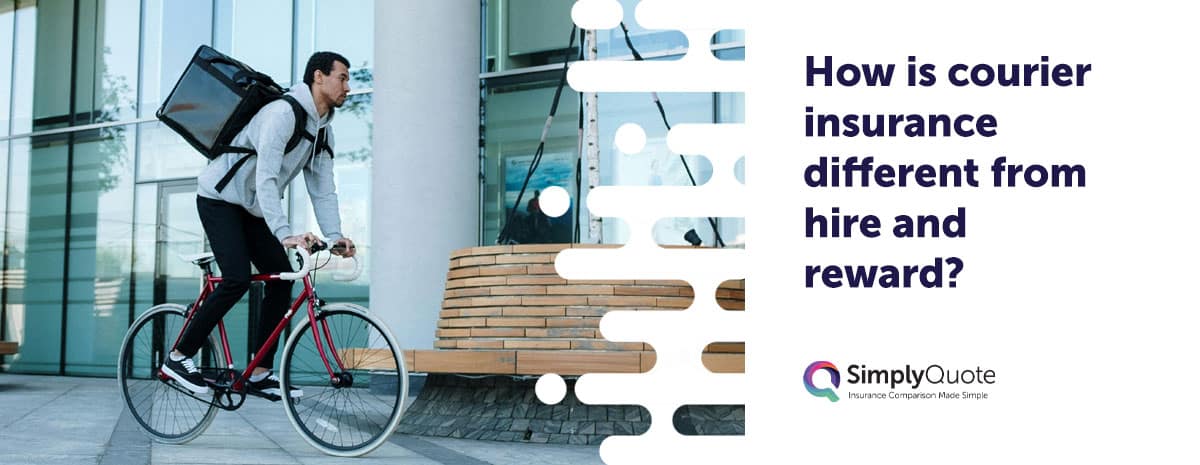How is courier insurance different from hire and reward?
Courier insurance is a type of insurance policy package tailored for delivery drivers, while hire and reward is a specific usage classification that forms just one part of that policy.
In other words: courier insurance includes hire and reward—but hire and reward on its own doesn’t mean you’re fully covered as a courier.
Think of it like this: hire and reward gives you legal permission to carry goods for payment. But it doesn’t protect the goods you’re carrying, or cover you if you damage someone’s property while delivering. It’s just the entry ticket—not the full protection.
Courier insurance, by contrast, is built specifically for the job. It bundles together the vehicle insurance (with hire and reward usage), plus other essential elements like goods in transit cover, public liability, and often legal expenses or breakdown cover.
Too many new couriers assume that getting “hire and reward” tacked onto a personal policy is enough. It isn’t. And if something goes wrong while you’re working—without the right type of cover—you could end up uninsured, unprotected, and fully liable.
This guide breaks down what each means, where the overlap ends, and how to make sure you’re truly covered when you hit the road.

What does hire and reward actually mean?
Hire and reward means using your vehicle to carry goods or people in exchange for payment—it’s a legal classification of how your vehicle is used.
If you’re making money from the journey, you need hire and reward cover. No exceptions.
This isn’t optional. It’s defined under the Road Traffic Act 1988 and enforced by UK law. If your insurance policy doesn’t explicitly allow for hire and reward use, and you’re delivering goods (even part-time), you’re uninsured in the eyes of the law.
Common examples that require hire and reward:
- Delivering parcels for Amazon Flex, Evri, or Yodel
- Food delivery via Uber Eats, Just Eat, or Deliveroo
- Transporting goods for clients as a self-employed driver
- Operating under same-day courier services or on delivery apps
Importantly, hire and reward doesn’t give you full protection. It only modifies your vehicle insurance to say you’re allowed to use the vehicle for commercial trips. It does nothing to cover the contents you carry, protect you if someone sues you for property damage, or help if your vehicle breaks down mid-shift.
It’s a foundation—but it’s not a safety net.
Looking to compare courier insurance? Get your quote today!
Get QuotesWhat does courier insurance include that hire and reward doesn’t?
Courier insurance includes hire and reward, but it also adds extra layers of protection tailored to the job—like goods in transit cover, public liability insurance, and breakdown assistance.
Hire and reward is only a single usage classification. Courier insurance is the complete policy.
Here’s what courier insurance often includes beyond hire and reward:
- Goods in Transit Insurance – Covers the items you’re delivering if they’re lost, damaged, or stolen en route. Hire and reward doesn’t protect your cargo.
- Public Liability Insurance – If you injure someone or damage their property while delivering, this covers compensation claims and legal costs. A must-have if you’re delivering to homes or businesses.
- Vehicle Cover (with Hire and Reward Use) – This is the legally required part—but courier insurance ensures your insurer knows your true usage, reducing risk of policy invalidation.
- Legal Expenses Insurance – Covers solicitor costs if you’re taken to court or need to defend yourself against a third-party claim.
- Breakdown Cover (Courier-Specific) – Designed for working vehicles—includes recovery with goods onboard, replacement vans, and time-sensitive repairs.
- Excess Protection or Replacement Vehicle Add-ons – Helps reduce out-of-pocket expenses and avoid income loss during claims or repairs.
In short: hire and reward gets you on the road legally. Courier insurance keeps you on the road securely. The two aren’t interchangeable—and if you’re relying on hire and reward alone, you’re likely underinsured.
Can I just get hire and reward cover without courier insurance?
Yes, you can technically buy hire and reward insurance on its own—but it’s the bare legal minimum, and leaves you exposed to financial and operational risk.
You’ll be legal to drive, but not necessarily protected where it matters.
Hire and reward is like a licence to work—it tells your insurer and the authorities that you’re using your vehicle to carry goods for payment. That’s it. It doesn’t cover the parcels in the back, the client’s shopfront you accidentally damage, or your legal costs if someone sues you over a delivery gone wrong.
Here’s what you won’t get with hire and reward alone:
- No goods in transit cover – damage, theft, or loss? You pay.
- No public liability protection – injure someone, damage property? That’s on you.
- No breakdown assistance – break down mid-shift, you’re on your own.
- No income protection or replacement vehicle – one incident could mean a week off work with zero earnings.
Some newer drivers or gig workers try to cut corners by adding hire and reward to a personal policy. Insurers may allow it—but they rarely explain how limited that protection really is. And if your job depends on reliability, reputation, and fast recoveries from disruption, minimal cover isn’t just risky—it’s shortsighted.
In reality, courier insurance is just hire and reward plus everything you’d actually want when something goes wrong.
Who needs courier insurance vs just hire and reward?
If you’re working as a courier—whether full time, part time, or on gig platforms—you need courier insurance, not just hire and reward.
Hire and reward alone may make you legal, but it won’t make you protected. And in most real-world scenarios, that gap matters.
Let’s break it down:
- Full-Time Couriers: If you deliver goods as your primary income, you need courier insurance—no question. You’re carrying valuable items daily, dealing with customers, and exposed to all kinds of risk on the road and at delivery locations.
- Gig Workers (Uber Eats, Amazon Flex, Just Eat): Even if you only deliver part time, you still need courier insurance. Most platforms won’t accept hire and reward-only policies, especially if they don’t include goods in transit or liability protection.
- Multi-Vehicle or High-Value Deliveries: If you operate more than one vehicle or handle expensive items (electronics, medical gear, tools), you need broader cover. Basic hire and reward won’t cover the cargo—or your income if something goes wrong.
- Self-Employed or Sole Traders: If you’re your own business, any uninsured claim comes out of your pocket. Public liability and legal protection aren’t just extras—they’re your defence strategy.
Technically, a driver doing the odd favour, like delivering for a friend once or twice, might get away with short-term hire and reward. But once money’s changing hands and you’re using the vehicle commercially, the smart (and safe) choice is full courier insurance.
Final thoughts
Courier insurance and hire and reward aren’t interchangeable. One’s a usage classification; the other’s a purpose-built insurance package. Hire and reward gets you legal; courier insurance keeps you operational, covered, and in business when things go wrong.
Too often, new drivers assume that adding hire and reward to a personal policy is enough. It might tick the legal box—but it leaves out everything that matters: your cargo, your income, and your liability if something goes wrong on the job.
Courier insurance fills those gaps. It’s designed for the realities of delivery work—tight schedules, unpredictable road conditions, valuable items, and direct interaction with the public. Whether you’re full-time, part-time, or just starting out, if your vehicle is your livelihood, you need more than permission to drive. You need protection to keep going.
So, if you’re comparing policies, don’t just ask what’s cheapest. Ask what’s covered. Ask what happens when the van breaks down, when a parcel gets damaged, or when a customer trips over a box on their doorstep.
Courier insurance is more than hire and reward—it’s peace of mind for people who get paid to move things. And that peace of mind is worth every penny.
Frequently Asked Questions (FAQs)
No. Courier insurance includes hire and reward but also covers goods in transit, public liability, and legal expenses. Hire and reward alone only covers your vehicle’s commercial use.
They might—especially if the claim involves cargo loss, property damage, or legal liability. Hire and reward won’t cover those scenarios unless they’re included in a broader courier package.
Not by default. Public liability is usually a separate add-on or included within a broader courier insurance policy. Hire and reward only covers the vehicle—not the risks you pose to people or property.
No. Courier insurance is built on top of hire and reward. If your policy doesn’t include hire and reward use, it won’t be valid for delivery work.
Not usually. Most platforms require full courier insurance that includes goods in transit and sometimes public liability. Hire and reward alone may not meet their minimum requirements.
No. Hire and reward doesn’t protect the goods you’re carrying. For that, you need goods in transit insurance—usually included in or added to a courier policy.
Yes—but only if the vehicle is insured for that type of use and declared properly. Still, it’s safer to get full courier cover to protect the items and any damage risks.
Yes—but it offers less protection. Courier insurance costs more because it includes extra cover types. Hire and reward is just the legal base layer.
